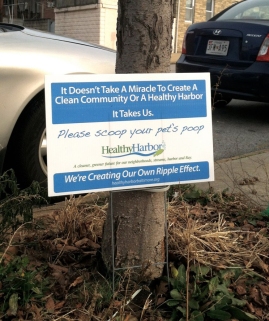First: Please know that we love our pets. This post is about human behavior, not pets!
Have you heard of the Poop Fairy? The first thing you should know about her is that she doesn’t exist. Many municipalities use the myth of the Poop Fairy in campaigns to remind residents that there is no magical way to make dog poop “go away”.
Just like with littering, some people may not realize the impact their behavior has on waterways, and some may simply not care. Some may even think it’s good to leave it to fertilize the grass.
Besides the immediate issues, like the fact that it looks bad, smells gross, and that unfortunate (and subsequently irate) people step in it, there are plenty of other reasons cities are campaigning to decrease the doo doo:
- Nutrients – Pet waste adds to nutrient pollution, which in turn increases algal blooms which block light for aquatic life and deplete the water of oxygen when it decays.
- Bacteria – E. coli, giardia, and salmonella.
- Parasites – Roundworms, hookworms, and cryptosporidium.
- It lasts – Dog poop doesn’t break down quickly because of the foods we feed them. It sticks around and builds up in parks, or washes down storm drains during rain events.
- It is concentrated – Any open space that has access to pets can become ground zero for these pollutants, especially in urban areas that have limited open space areas. With highly concentrated use, stormwater runoff from these areas is a toxic soup.
In short, research is showing that this is a significant part of urban pollution. The chart below shows the estimated amount of waste being left on the ground by dog owners in the city of Baltimore alone:
Stormwater in Baltimore washes dog waste (that’s thousands of tons per year) into storm drains, then streams like Herring Run or Jones Falls, and then Baltimore Harbor and the Chesapeake Bay.
 The best methods for dealing with dog waste are to seal it in a bag and dispose of it in the regular trash, which bothers some because it might never break down in a landfill, or you could flush it so it will be treated along with other sewage. Cat waste, however, should not be flushed because a parasite common to felines, Toxoplasma Gondii, is not killed by regular sewage treatment methods.
The best methods for dealing with dog waste are to seal it in a bag and dispose of it in the regular trash, which bothers some because it might never break down in a landfill, or you could flush it so it will be treated along with other sewage. Cat waste, however, should not be flushed because a parasite common to felines, Toxoplasma Gondii, is not killed by regular sewage treatment methods.
Check out these sites for more info:
- The Myth of the Poop Fairy
- US EPA: Pet Waste Management
- Chesapeake Bay Program: Nutrients
- Healthy Harbor Neighborhood Green Guide
http://sustainablestormwater.org/2013/03/11/there-is-no-poop-fairy/




